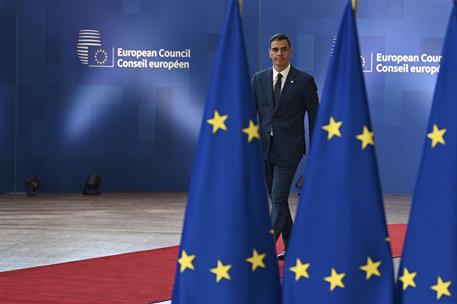European Council
Sánchez claims that the green and digital transitions are the drivers of growth for a "stronger, more competitive and more secure EU"
President's News - 2024.4.18
Bilateral meeting between the President of the Government of Spain, Pedro Sánchez, and the Prime Minister of Malta, Robert Abela | Pool Moncloa/Jorge Villar - 2024.4.18
In this respect, leaders also discussed the so-called Letta report, presented at this Council, which focuses on the current state and future of the European single market.
The current economic, technological and geopolitical challenges have made the need for a new European competitiveness deal even more evident.
The President of the Government argued that the response to this challenge must be comprehensive and ambitious, focused on strengthening the single market and the economic security of the Union, allowing the deployment of an industrial policy that does not generate "toxic rivalry" between Member States.
In this sense, the president pointed out that the transformation of the production model should be based on digital transformation and green innovation, developing an ambitious industrial policy with a European vision that will drive growth.
Leaders agreed that such a policy will require more funding, both public and private, and that it will be necessary to discuss and design the creation of additional funding instruments. In this respect, Sánchez advocated the development of new common financing instruments that are sufficient and stable over time and that respond to the construction of European public goods.
He also advocated better regulation of national aid within the EU to protect the single market, simplifying processes to help speed up the deployment of projects and investments, noting that, to this end, "it is necessary to rethink the role of the European Investment Bank".
However, he warned that improving Europe's economic competitiveness must not lead to a regression in social policies. Improving working conditions for workers, such as better wages or more stimulating and work-life friendly working hours, should not be an obstacle to competitiveness. This is the only way to retain the talent Europe needs.
"The Spanish economy is experiencing one of its best moments," said the president. It is growing faster than the European average and the International Monetary Fund predicts that Spain will be the second fastest growing Western economy in the coming years, behind the United States. For this reason, he explained, in order to continue on this good economic path, it is necessary for the European economy to do the same.
The Letta report
At this Council, the former Italian Prime Minister and current President of the Jacques Delors Institute, Enrico Letta, presented the strategic report on the state of the single market commissioned by the EU Council under the current Belgian Presidency.
In the report, Letta advocates reforming the single market, adapting it to the 21st century, pointing out the need to finance the green and digital transitions, guarantee economic security, incorporate a 'fifth freedom' to enhance research and innovation, place a greater focus on SMEs and, all of this, with a social dimension that guarantees social justice, equal opportunities and the well-being of citizens.
The President of the Government agreed with the approaches and reforms presented in the report. The current global challenges create an opportunity for further integration, such as the completion of the Capital Markets Union, said Sánchez, which will help to attract private investment, diversify sources of financing and undertake the necessary transformations. It is also about moving towards an investment union so that Europeans' savings stay in Europe and are used to finance businesses and jobs.
The internal market is the pillar of European prosperity, so developing mechanisms to strengthen the EU's competitiveness without fragmenting it is the real challenge facing Europe, the President explained.
Any reform, Sánchez added, must place citizens and our social model at the centre of the debate in order to contribute to cohesion and benefit all corners of the EU. This in itself legitimises the single market and enhances competitiveness.
Bilateral meetings with Malta and Luxembourg
Bilateral meeting between the President of the Government of Spain, Pedro Sánchez, and the Prime Minister of Malta, Robert Abela | Pool Moncloa/Borja Puig de la Bellacasa y Pool UE
During the day, the President of the Government held bilateral meetings with the Prime Minister of Malta, Robert Abela, and the Prime Minister of Luxembourg, Luc Frieden, to discuss the situation in the Middle East.
At the meeting with Malta, both leaders reiterated their commitment to recognise the Palestinian state when conditions are appropriate and when this can contribute to the peace process, reaffirming the commitments made by both countries at the last European Council together with Ireland and Slovenia.
Malta is chairing the UN Security Council this April, where a crucial debate on the situation in the Middle East will be held at its proposal.
A view also shared by the Prime Minister of Luxembourg. Sánchez and Frieden reaffirmed the need for an immediate ceasefire, the arrival of humanitarian aid, the immediate and unconditional release of the hostages and a diplomatic solution to the conflict through the two-state solution in order to offer a horizon of peace and stability to the region.
Non official translation





